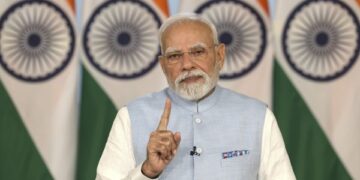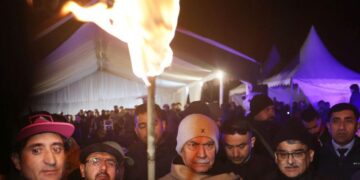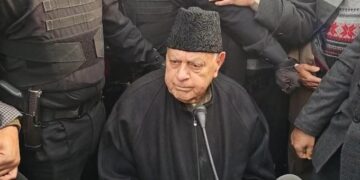Srinagar: The High Court of J&K and Ladakh has dismissed the petition of an elderly couple facing deportation.
The couple comes from a family of permanent residents and landholders of Kashmir but became the citizens of Pakistan after the 1947 partition.
The couple — Mohammad Khalil Qazi and Arifa Qazi — were born in Srinagar in 1945 and 1962 respectively. They are cousins, and got married in 1986 in Rawalpindi, Pakistan.
In 1988, they came back to Kashmir along with their new-born baby on a valid travel document. They have been living here on the basis of extended permits in the Baha-ud-din Sahab quarter of the city.
During the partition, Mohammad Khalil Qazi’s father Ghulam Mohammad Qazi was doing business in Rawalpindi, (now in Pakistan). As the war broke out in Kashmir between the two newly-born nations in 1948, junior Qazi, then a four-year-old child, was stranded in Pakistan. Neither he nor his family could return to Srinagar, leading to involuntary acquisition of Pakistani nationality due to compelling circumstances beyond their control.
Later on, in the divided family of Qazi’s on this side of the ceasefire line (now LoC) was born Arifa in April 1962. A “permanent resident” of the State of Jammu & Kashmir like her parents, she in 1986 got an Indian passport and visited Pakistan along with her family to meet the rest of her clan. Being a cousin of Qazi, who was by then 41 years old, she was married off to him in Rawalpindi the same year.
Following the marriage, the situation turned hostile for her. She started facing “serious and cruel treatment from her in-laws”, in Pakistan. However, Qazi, her husband, remained sympathetic towards her.
“The in-laws also allegedly deprived petitioner No. 1 of his business (Qazi), making their life together highly insecure and marked by mental anguish and anxiety,” reads the writ petition filed by the couple in J&K High Court in 1990 challenging their deportation to Pakistan.
In view of their stated plight in Pakistan and their pre-existing legal status as permanent residents of the then state of Jammu and Kashmir, the couple expressed a desire to continue residing in Srinagar. Their applications for an extended stay were considered, and the Ministry of Home Affairs, Government of India, granted successive extensions for their stay.
They also approached the authorities for resumption of an Indian citizenship, relying on their permanent resident status and other equitable considerations.
However, during the pendency of their issue an order of deportation was issued by the Government of India against the couple.
They approached the court, which stayed their expulsion to Pakistan. Their counsel argued “the respondent authorities have acted illegally, unlawfully, and in blatant disregard of the valuable legal rights of the petitioners to continue holding Indian citizenship, by proceeding to forcibly deport the petitioners from India to Pakistan”.
Counter affidavit filed by the authorities reads “the petitioners are neither permanent residents nor citizens of India and they have admitted in their writ petition that they have acquired citizenship of Pakistan”.
It made the basis of Section 9(1) of the Citizenship Act of 1955 to back its point in the case.
Justice Sindhu Sharma while adjudicating the matter held that the petitioners have voluntarily acquired the citizenship of another country in terms of Section 9 of the Citizenship Act 1955 and were aware of their status when they entered Kashmir in 1988.
Citing certain apex court judgments, Justice Sharma said “the petitioners have acted at their own volition, acquired the citizenship of a foreign country. Their passports and the residential permit issued in their favour are cogent, unequivocal evidence of the fact that the petitioners are not citizens of India and, as such, orders to deport them were valid”.
They, the judge said, have not placed on record any documentary proof of the fact that they had applied for citizenship in terms of the Citizenship Act or Rules. There is nothing on record to suggest that their request for grant of citizenship of India has been accepted.
The couple has been residing in Srinagar since 1988 and during this period they have not placed anything on record to show that they are citizens of this country, said the judge and dismissed their petition against their deportation to Pakistan.








